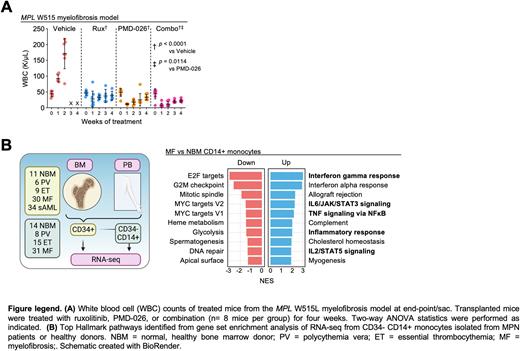Abstract
Myeloproliferative neoplasms (MPNs) are a group of hematological malignancies driven by hyperactive JAK-STAT signaling. Disease progression and potential transformation to secondary acute myeloid leukemia (sAML) are a consequence of the complex interplay between oncogenic drivers, distinct cellular populations, and temporal interactions, and most recently, a fourth pillar encompassing the pro-inflammatory cytokine milieu driven in part by NFκB pathway signaling. As such, current therapeutic approaches primarily targeting JAK2 demonstrate symptom control but are not curative, thus necessitating advances into novel approaches that overcome these combinatorial risk factors.
We previously demonstrated that RPS6KA1 (RSK1) is overexpressed in AML, critical for cell survival, and associated with worse patient survival outcomes. Although RSK1 remains a promising therapeutic target, current pre-clinical inhibitors demonstrate poor pharmacokinetic profiles, thus limiting further translational development. Here, we perform mechanistic studies to characterize and exploit this RSK1 dependency in MPN/sAML. We further target RSK1 in vitro, ex vivo, and in vivo with PMD-026, a first-in-class oral RSK1-4 inhibitor currently undergoing Phase 1/1b clinical trials in patients with metastatic breast cancer.
We first performed RNA-sequencing on CD34+ cells from 45 MPN patients and 11 healthy donors. Gene set enrichment analysis revealed augmented TNF/NFκB, JAK-STAT and PI3K/AKT/mTOR signaling pathways in myelofibrosis (MF) patients with elevated RPS6KA1 expression. RNA-seq of CD34+ cells from an additional 34 sAML patients showed similar enhancement of driver pathways. Following, in JAK2-V617F cell lines, PMD-026 suppressed oncogenic RSK1, mTOR, and S6 signaling and induced apoptosis and cell cycle arrest. Ex vivo, PMD-026 preferentially inhibited colony formation of MPN CD34+ cells compared to those from healthy donors, while RPS6KA1 knockdown also inhibited colony formation from diseased but not healthy donors. Moreover, PMD-026 potently alleviated leukocytosis and disease burden in conjunction with prolonged survival in the MPL W515L retroviral MF mouse model, both alone and in combination with ruxolitinib (Fig. A). Similar elimination of leukemic cells was observed in patient-derived xenograft NSGS mice that were transplanted with CD34+ cells from an sAML patient after RPS6KA1 perturbation. These results indicate potency and specificity of RSK1 inhibition in targeting MPN/sAML.
Moreover, we observed elevated expression of RPS6KA1 in patients with acute myelomonocytic (M4) and monocytic (M5) leukemia, compared to other AML FAB subtypes, in addition to correlations between RPS6KA1 and CD14 expression across our MPN, TCGA LAML and BeatAML cohorts. We thus performed further RNA-seq on CD34- CD14+ monocytes from 54 MPN patients and 14 healthy donors (Fig. B). Differential gene and pathway analyses revealed consistent upregulation of JAK-STAT, inflammatory cytokine, and TNF/NFκB pathways, and enrichment of key effectors including TNF, IL6, CCL4, and CCL5 in patient monocytes. Following, we utilized high-resolution, multi-omic approaches in single cell RNA-seq and mass cytometry and observed monocyte-driven enrichment of inflammatory and NFκB signatures with concurrent elevation of RPS6KA1 expression in monocytes concordant with disease progression in serial samples at MF post-PV compared to antecedent PV of an MPN patient.
Lastly, we investigated whether RSK1 inhibition could also suppress disease progression in part through modulating this monocyte-mediated inflammatory niche. Acute PMD-026 treatment of MPN patient CD14+ monocytes resulted in suppression of TNF, IL6, CXCL8, CCL4 and CCL5 cytokine mRNAs, while simultaneously reducing NFKB1 and NFKB2 expression. At the protein level, PMD-026 also inhibited NFκB signaling by reversal of TNF-induced IκB⍺ degradation and p65/RelA S536 phosphorylation in JAK2 mutant cell lines. Thus, RSK1 may play a critical role in augmenting the pro-inflammatory microenvironment through potent effector monocytes.
Our findings are first in demonstrating pre-clinical efficacy of a clinical grade RSK1 inhibitor, PMD-026, for the treatment of myeloid malignancies and highlight RSK1 inhibition to be two-pronged, by suppressing oncogenic signaling and inhibiting the CD14+ monocyte-driven pro-inflammatory milieu.
Disclosures
Oh:Kartos: Consultancy, Membership on an entity's Board of Directors or advisory committees; PharmaEssentia: Consultancy, Membership on an entity's Board of Directors or advisory committees; Celgne/BMS: Consultancy, Membership on an entity's Board of Directors or advisory committees; CTI BioPharma: Consultancy, Membership on an entity's Board of Directors or advisory committees; Geron: Consultancy, Membership on an entity's Board of Directors or advisory committees; Disc Medicine: Consultancy, Membership on an entity's Board of Directors or advisory committees; Novartis: Consultancy, Membership on an entity's Board of Directors or advisory committees; Sierra Oncology: Consultancy, Membership on an entity's Board of Directors or advisory committees; Incyte: Consultancy, Membership on an entity's Board of Directors or advisory committees; Constellation: Consultancy, Membership on an entity's Board of Directors or advisory committees; Blueprint Medicines: Consultancy, Membership on an entity's Board of Directors or advisory committees; AbbVie: Consultancy, Membership on an entity's Board of Directors or advisory committees.
Author notes
Asterisk with author names denotes non-ASH members.


This feature is available to Subscribers Only
Sign In or Create an Account Close Modal